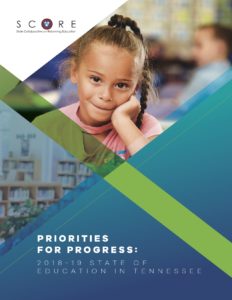NASHVILLE – Thirty-eight educators have been selected for the 2018-19 class of the Tennessee Educator Fellowship, the State Collaborative on Reforming Education (SCORE) announced today.
“The Tennessee Educator Fellowship has brought together dynamic and talented educators who are passionate advocates for education policies and practices that can improve student achievement,” SCORE Executive Chairman and CEO Jamie Woodson said. “The fellows’ diverse perspectives and experiences are invaluable as they work both inside and outside the classroom and participate in state conversations on preparing all students for postsecondary and workforce success.”
The Tennessee Educator Fellowship is a yearlong program that helps teachers, school counselors, and librarians learn about education policy and equips them to advocate for their students and their profession. The educators chosen this year work in a variety of settings: traditional public schools, public magnet schools, public charter schools, public Montessori schools, an alternative academy within a public school and a school dedicated to serving children with multiple disabilities.
Since 2014, the fellowship has supported nearly 150 teachers to engage in the discussion about education policy by speaking at public events, inviting policymakers into their classrooms, writing about their experiences in state and national publications, creating regional professional networks and serving on state-level policy committees.
“The 38 fellows bring unique perspectives to the table—from different backgrounds, grade levels, subjects and regions of the state—to focus on ensuring greater academic achievement and growth for all Tennessee students,” SCORE Educator Engagement Associate Leigh Cooksey said.
This is the fifth year of the Tennessee Educator Fellowship. The fellows chosen for the 2018-19 cohort have a combined teaching experience of 479 years and represent elementary, middle and high schools in 24 districts across East, Middle and West Tennessee. The members of this cohort teach English language arts, math, science, social studies, information technology and special education in urban, suburban and rural schools. The cohort also includes a librarian and several educators who serve as school counselors. Additionally, 42 percent of this year’s fellows identify as educators of color, better representing the diversity of Tennessee’s student body.
The 2018-19 Tennessee Educator Fellows are:
Nathan Bailey teaches career technical education at Sullivan North High School in Sullivan County Schools. Bailey has been teaching for nine years.
Kalisha Bingham-Marshall teaches seventh-grade math at Bolivar Middle School in Hardeman County Schools. Bingham-Marshall has been teaching for seven years.
Sam Brobeck teaches eighth-grade math at Memphis Grizzlies Preparatory Charter Middle School in Shelby County Schools. Brobeck has been teaching for three years.
Monica Brown teaches fourth-grade English language arts and social studies at Oakshire Elementary School in Shelby County Schools. Brown has been teaching for 11 years.
Dr. Nick Brown is a school counselor at Westmoreland Elementary School in Sumner County Schools. Brown has worked in education for eight years.
Dr. Sherwanda Y. Chism teaches grades 3-5 English language arts and gifted education at Winridge Elementary School in Shelby County Schools. Chism has been teaching for 20 years.
Richard J. Church teaches grades 7-8 at Liberty Bell Middle School in Johnson City Schools. Church has been teaching for 19 years.
Ada Collins teaches third grade at J.E. Moss Elementary School in Metropolitan Nashville Public Schools. Collins has been teaching for eight years.
Lynn Cooper is a school counselor at South Pittsburg High School in Marion County Schools. Cooper has worked in education for 17 years.
Colletta M. Daniels teaches grades 2-4 special education at Shrine School in Shelby County Schools. Daniels has been teaching for six years.
Brandy Eason is a school counselor at Scotts Hill Elementary School in Henderson County Schools. Eason has worked in education for 4½ years.
Heather Eskridge is a school counselor at Walter Hill Elementary School in Rutherford County Schools. Eskridge has worked in education for 20 years.
Klavish Faraj teaches third-grade math and science at Paragon Mills Elementary School in Metropolitan Nashville Public Schools. Faraj has been teaching for five years.
Mavis Clark Foster teaches fifth-grade English language arts and science at Green Magnet Academy in Knox County Schools. Clark Foster has been teaching for 16 years.
Ranita Glenn teaches grades 2-5 reading at Hardy Elementary School in Hamilton County Department of Education. Glenn has been teaching for 11 years.
Telena Haneline teaches first grade at Eaton Elementary School in Loudon County Schools. Haneline has been teaching for 19 years.
Dr. Tenesha Hardin teaches first grade at West Creek Elementary School in Clarksville-Montgomery County Schools. Hardin has been teaching for 17 years.
Thaddeus Higgins teaches grades 9-12 social studies at Unicoi County High School in Unicoi County Schools. Higgins has been teaching for 3½ years.
Neven Holland teaches fourth-grade math at Treadwell Elementary School in Shelby County Schools. Holland has been teaching for three years.
Alicia Hunker teaches sixth-grade math at Valor Flagship Academy in Metropolitan Nashville Public Schools. Hunker has been teaching for 10 years.
Alex Juneau teaches third grade at John Pittard Elementary School in Murfreesboro City Schools. Juneau has been teaching for 11 years.
Lyndi King teaches fifth-grade English language arts at Decatur County Middle School in Decatur County Schools. King has been teaching for six years.
Rebecca Ledebuhr teaches eighth-grade math at STEM Preparatory Academy in Metropolitan Nashville Public Schools. Ledebuhr has been teaching for eight years.
Dr. Aleisha McCallie teaches fourth-grade math and science at East Brainerd Elementary School in Hamilton County Department of Education. McCallie has been teaching for 12 years.
Brian McLaughlin teaches grades 10-12 math at Morristown-Hamblen High School West in Hamblen County Schools. McLaughlin has been teaching for 10 years.
Caitlin Nowell teaches seventh-grade English language arts at South Doyle Middle School in Knox County Schools. Nowell has been teaching for six years.
Dr. Paula Pendergrass teaches advanced academics resources at Granbery Elementary School in Metropolitan Nashville Public Schools. Pendergrass has been teaching for 23 years.
Julie Pepperman teaches eighth-grade science at Heritage Middle School in Blount County Schools. Pepperman has been teaching for 23 years.
Kelly Piatt is a school counselor at Crockett County High School in Crockett County Schools. Piatt has worked in education for 18 years.
Ontoni Reedy teaches grades 1-3 at Community Montessori in Jackson-Madison County Schools. Reedy has been teaching for eight years.
Tiffany Roberts teaches algebra and geometry at Lincoln County Ninth Grade Academy in Lincoln County Schools. Roberts has been teaching for 26 years.
Craig Robinson teaches grades 3-5 science at Georgian Hills Achievement Elementary in the Achievement School District. Robinson has been teaching for four years.
Jen Semanco teaches 10th- and 11th-grade English language arts at Chattanooga Girls Leadership Academy in Hamilton County Department of Education. Semanco has been teaching for 16 years.
Amanda Smithfield is a librarian at Hume-Fogg Academic Magnet School in Metropolitan Nashville Public Schools. Smithfield has worked in education for 23 years.
Cyndi Snapp teaches fourth-grade math at Carter’s Valley Elementary School in Hawkins County Schools. Snapp has been teaching for 21 years.
David Sneed teaches 12th-grade English at Soddy Daisy High School in Hamilton County Department of Education. Sneed has been teaching for 21 years.
Yolanda Parker Williams teaches fifth-grade math at Karns Elementary School in Knox County Schools. Parker Williams has been teaching for 18 years.
Maury Wood II teaches grades 4-6 technology at Westhills Elementary School in Marshall County Schools. Wood has been teaching for eight years.
Past fellows have led new education initiatives and worked to improve outcomes for all students. Their work has included starting a teacher-nominated leadership academy for students to explore a career in teaching; bringing community leaders into classrooms to discuss the importance of literacy in their careers; advocating for the use of high-quality instructional materials; expanding access to early postsecondary opportunities for students; amplifying the voice, presence, and support for educators of color; and much more. Fellows also have engaged in education conversations at the local, state, and national level and written op-eds and blog posts for news and education outlets like The Tennessean, Education Post, and Hechinger Report.
Throughout the upcoming year, the fellows will learn through in-person and online seminars and will serve as liaisons between their colleagues, their communities, and policymakers as Tennessee continues the work of improving and lifting academic achievement for all students.
















